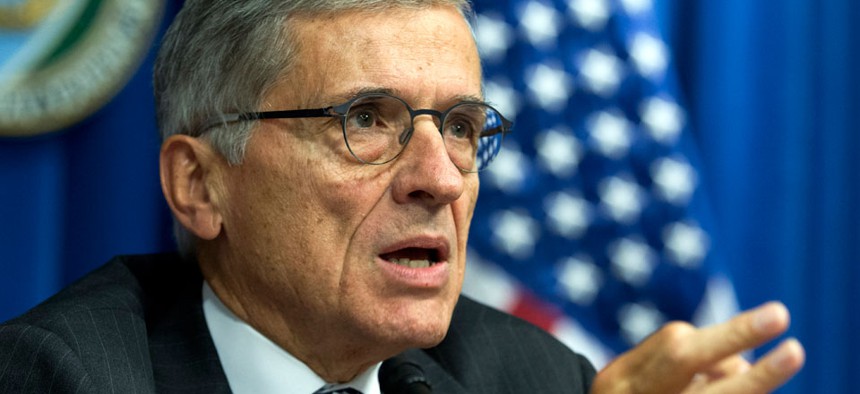FCC Demands Faster Broadband

Federal Communications Commission Chairman Tom Wheeler. Jose Luis Magana/AP
Republicans complain that increasing the definition of "broadband" is meant to justify power grabs.
The Federal Communications Commission voted Thursday to increase how fast Internet service has to be to be considered "broadband."
The move is only symbolic—it won't actually force Internet providers to offer faster speeds. But it's a clear shot at the major cable and telecom providers for failing to deliver sufficient service to all Americans.
In a 3-2 vote, the commission's Democrats approved a report that defines broadband as 25 megabits per second for downloads and 3 Mbps for uploads. The commission had previously defined broadband as 4 Mbps for downloads and 1 Mbps for uploads.
The report determines that the new standard is necessary for consumers to stream the high-quality videos that they increasingly expect, especially on multiple devices at the same time in a single household. But 17 percent of Americans, many in rural areas, lack any option for service at the new standard, the report found.
"As consumers adopt and demand more from their platforms and devices, the need for broadband will increase, requiring robust networks to be in place in order to keep up," FCC Commissioner Mignon Clyburn said. "And what is crystal clear is that the broadband speeds of yesteryear are woefully inadequate today and beyond."
The commission's two Republicans claimed that the new standard is actually just a ploy to justify future power grabs. By determining that broadband speeds are inadequate, the FCC is laying the legal groundwork for future regulations, including new net-neutrality rules, expected next month, the Republicans warned.
"For some time now under this administration, grounding the new benchmark for broadband in reality hasn't been the point," Republican Commission Ajit Pai said. "No, the ultimate goal is to seize new, virtually limitless authority to regulate the broadband marketplace."
The cable industry also complained that the new standard is much faster than many consumers actually want.
The National Cable and Telecommunications Association, which represents Comcast and other major providers, said it is "troubled" that the FCC chose a new definition that "ignores how millions of consumers currently access the Internet."
The move is "a clear effort to justify and expand the bounds of the FCC's own authority," the cable lobby said.
But FCC Chairman Tom Wheeler declared that the commission refuses to accept "self-serving lobbying statements."
He claimed that the providers are sending a different message to customers than they send to the FCC. He displayed advertisements from Comcast, Verizon, and Time Warner Cable that told customers they need to pay for upwards of 25 Mbps to get adequate service.
The commission has a responsibility, Wheeler said, to ensure that all Americans have access to real broadband.
NEXT STORY: Why Is Google Making Human Skin?



